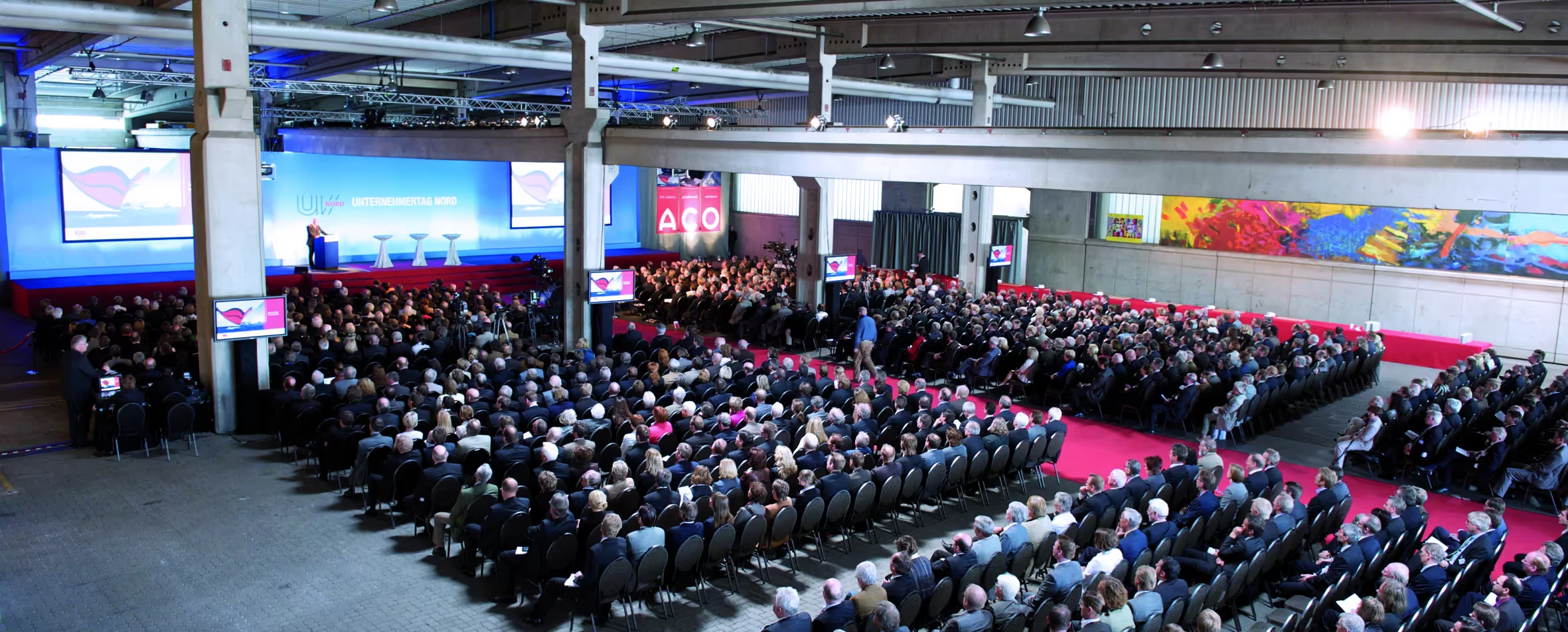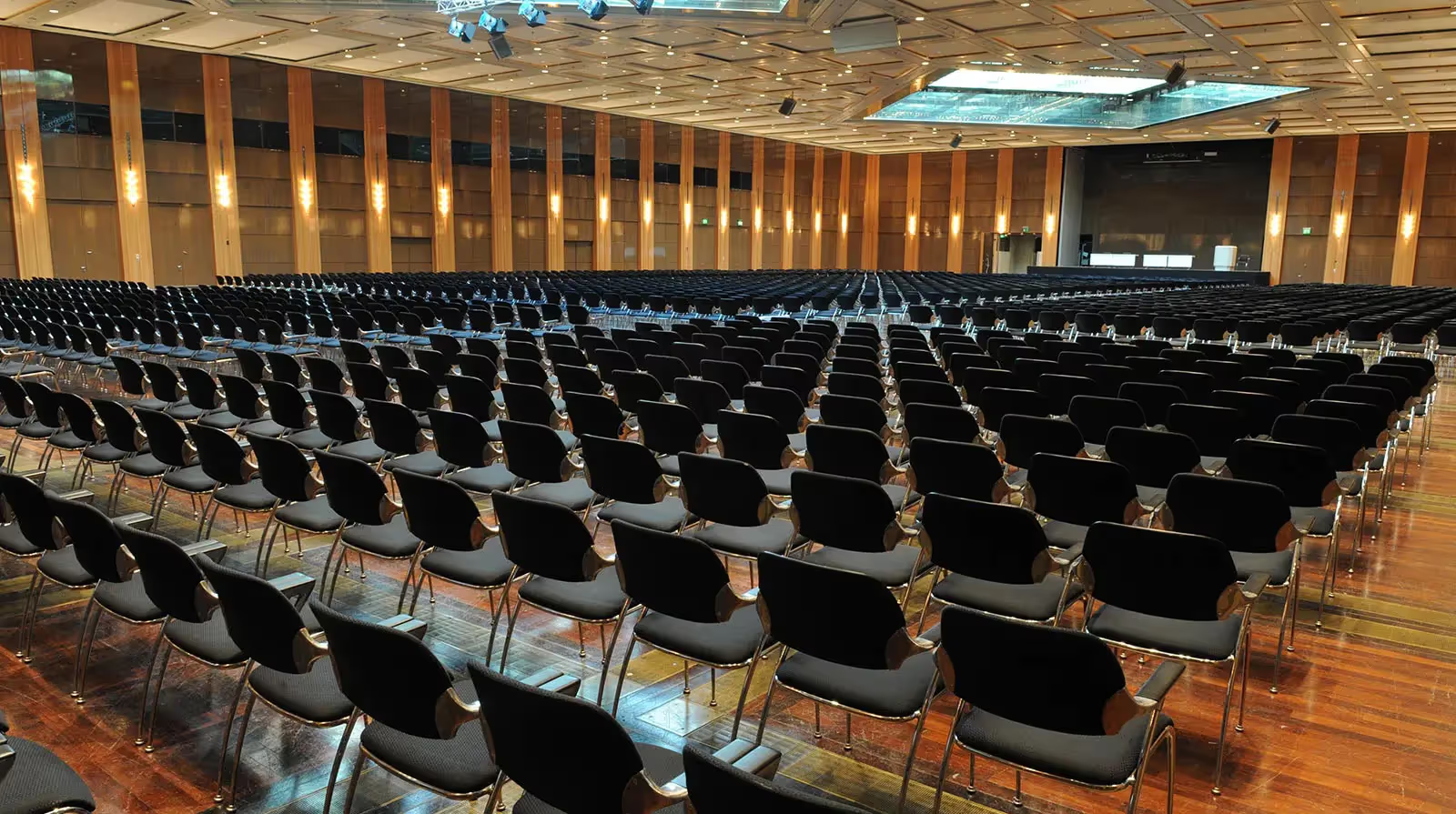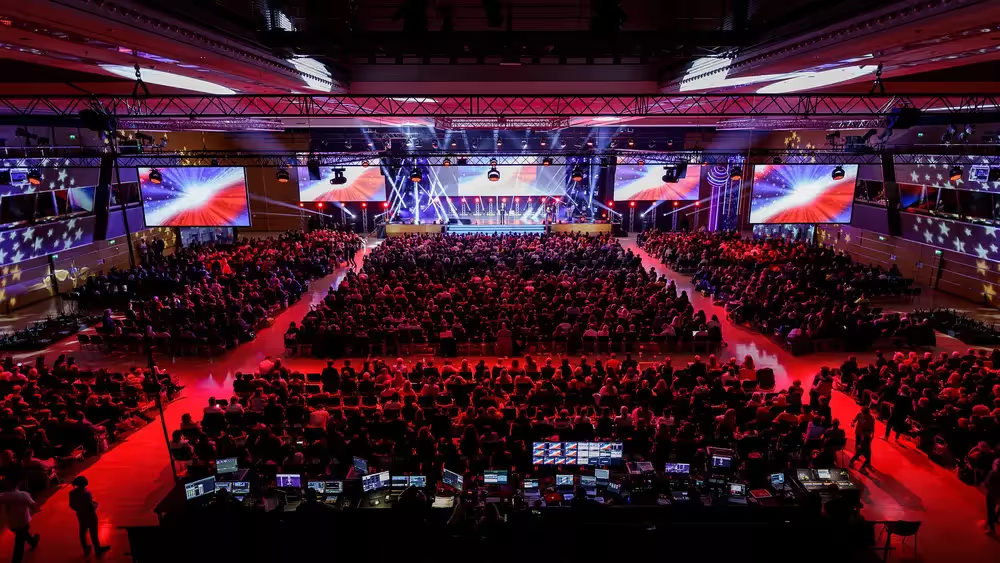Accreditation
Accreditation refers to the formal registration and access permission for participants, media representatives, or VIPs at an event, usually via personalised passes or badges.
A/V technology
A/V Technology stands for audio and video technology needed for an event. It includes everything from microphones and speakers to projectors and screens.
Backline
Backline is the technical basic equipment for live bands, such as instruments (e.g., drums, amplifiers) provided by the organiser.
Backstage
Backstage refers to the non-public area behind or beside the stage reserved for artists, crew, and production teams.
B2B events
“Business to business” events are aimed at companies. They serve to establish business contacts, exchange ideas, and explore new trends in the industry.
B2C events
“Business to customer” events are open to the general public and offer companies the opportunity to market their products and services directly to consumers.
Breakout session
A breakout session is a targeted interruption of the main programme, during which participants meet in small groups to discuss or work on a specific topic.
CAD plan
A CAD plan is a true-to-scale plan that contains all event buildings and facilities of an event venue.
Capacity
The capacity refers to the available number of seats or participation opportunities for an event.
Catering
Catering refers to the provision of food and drinks during an event, from snacks and beverages to full meals.
Check-in
The access process upon arrival of a participant at an event, usually to record attendance and verify entry permission.
Check-out
Leaving or formally concluding participation at an event, typically by logging the exit time.
Corporate event
Corporate events are events that are exclusively accessible to a closed target group in a business context.
Curfew
The “curfew” is the time when all dismantling work of an event must be completed.
Customer relationship management (CRM)
A CRM is a central system or database that stores and manages information about contacts and activities.
Deadline
The deadline is the last possible time for an activity or task in event management.
Dressing room
A dressing room is a room that serves as a changing room and preparation room for artists or speakers.
Early bird
The early bird tariff allows early registration at a reduced price.
Event manager
The person responsible for planning, organising, and executing events.
F&B
“F&B” stands for “food & beverage” and includes catering during an event.
Fireside chat
A Fireside Chat is an informal meeting in a small group where a specific topic is discussed.
Flying dinner
A flying dinner is an informal dinner concept where small portions of food are continuously served by waitstaff — ideal for networking events.
FOH / front of house
The area where the audience is located and where sound and lighting are controlled — also generally used for all audience-facing zones.
Giveaway
A small promotional gift given to event attendees to increase brand awareness or serve as a keepsake.
Guest management
Guest management includes the administration, communication and support of all invited and participating persons.
Get-in
The get-in is the fixed time at which the event staff must arrive before the guests arrive.
Go live
“Go live” refers to the time at which registration for an event is opened.
Greenroom
A room where artists or speakers relax before their performance, usually located near the stage.
Hybrid event
A hybrid event combines a live local audience with a simultaneous virtual live stream.
Hospitality
Hospitality covers the comprehensive guest care at events, including catering, lounge access, or VIP services.
Host/ess
A person who welcomes, informs, or assists guests at an event — often employed at reception, cloakrooms, or guest management.
In-person event
An in-person event takes place exclusively with the physical presence of the participants.
Keynote
A keynote is the opening speech or an important plenary session at an event.
Keynote speaker
The keynote speaker is the main speaker at an event who motivates and inspires the audience.
MICE
“MICE” stands for “meetings, incentives, conventions, and exhibitions” and describes various types of events in the event industry.
Networking
The targeted building and maintaining of contacts during an event.
No show
No show means participants who do not participate in the event even though they have signed up.
No show rate
The no show rate is the percentage of guests not showing up in relation to the total number of registrations.
Opening rate
The opening rate is the ratio of opened emails to the total number of emails sent when invited or reminded about an event.
PA system
A PA system is the audio system of an event venue.
Public event
Public events are events that are open to the general public.
PURL
PURL stands for “personal URL” and makes it easier for guests to register and participate in an event.
Reminder
A reminder is a communication measure to remind registered or non-registered contacts.
Request for information (RFI)
An RFI is a preparatory step for an offer request (RFP), in which companies request information about products and services from potential event providers.
Request for Proposal (RFP)
An RFP is a formal request from an event organiser to service providers to obtain offers to host an event.
Return of Investment (ROI)
The ROI is a performance measurement value for event organisations that shows the relationship between profit achieved and investment costs.
Rider
A rider is a list of requirements that artists or bands place on the event organiser.
Roadshow
A roadshow is a series of events held at various locations to promote a brand or product regionally and engage directly with target audiences.
Save the date
A save the date informs potential participants about the date of an event.
Session
A session is a session, presentation, or workshop that takes place during a larger event.
Showcaller
The showcaller is the person who coordinates the event flow and directs all involved parties (technical crew, stage, lighting, etc.) via headset — also known as the “director” of the live event.
Sponsor
A company or organisation that financially or materially supports an event.
Stagehand
A stagehand is a helper in the stage area responsible for setup and teardown, as well as positioning props, equipment, or instruments.
Subgate
A subgate is an additional check-in or access control point within an event, designated for specific rooms or areas. It regulates access for VIPs or selected target groups who have exclusive permission, for example because they booked this option.
tba
“to be announced” means that information has yet to be announced.
tbc
“to be confirmed” means that information has yet to be confirmed.
Ticketing
The process of selling and managing tickets for events.
Townhall
A townhall is a meeting where company leaders communicate directly with employees or other stakeholders. It serves to share information, answer questions, and promote transparency within the organisation.
Participant management
Participant management includes the administration, communication, and support of all invited and participating persons.
Virtual event
A virtual event takes place exclusively online, without the physical presence of the participants.
Walk-in
A walk-in is a person who attends an event spontaneously without prior registration. Walk-ins are often registered onsite at check-in or reception and granted access depending on availability.
Waiting list
A participant is placed on the waitlist when an event is fully booked. Participants can be placed on a waitlist in case spots become available due to cancellations.



















.svg)















































































